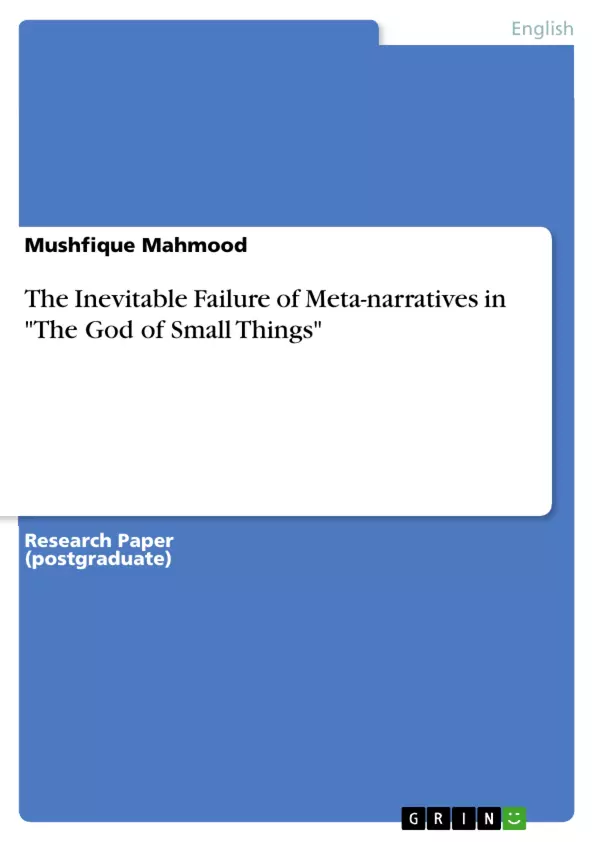Postmodern eye looks at human society from the vantage-point which is much criticized by the philosophers of a wide range of different disciplines. It is said that postmodernism fails to establish its own philosophy, own solution and, thereby, postmodern urge is kept aside all human endeavor looking at it with a suspicious eye. On the other hand, the postmodernists, addressing the all-inclusive-philosophies as meta-narratives, declare that the metanarratives have lost their power to convince and, therefore, advocate little narratives. However, this paper tries to respect the postmodern urges with the study of the novel The God of Small Things.
Inhaltsverzeichnis (Table of Contents)
- Introduction
- Literature Review
- Discussion and Analysis
- The theme of love
- The theme of social codes
- The theme of love, marriage and divorce
Zielsetzung und Themenschwerpunkte (Objectives and Key Themes)
This paper analyzes Arundhati Roy's novel *The God of Small Things* through a postmodern lens, focusing on the failure of meta-narratives and their inability to adequately explain the complexities of human experience. The paper argues that Roy's novel critiques the limitations of traditional societal structures, emphasizing the importance of individual narratives and the interconnectedness of personal experiences. The key themes explored include:- The failure of meta-narratives to account for the complexities of human experience
- The importance of individual narratives and "little narratives" in understanding the nuances of life
- The role of social codes and their impact on individual lives
- The consequences of love and its complexities within the confines of societal norms
- The theme of loss, trauma, and the enduring impact of past events
Zusammenfassung der Kapitel (Chapter Summaries)
- Introduction: The introduction establishes the theoretical framework for the analysis, situating *The God of Small Things* within the context of postmodern literary theory. It explores the concept of meta-narratives and their decline in the postmodern era, highlighting the shift towards "little narratives" as a means to understand human experience more effectively.
- Literature Review: This section examines previous scholarly work on *The God of Small Things*, focusing on interpretations that emphasize the novel's postmodern elements. It discusses how the novel tackles themes of marginality, power, and the complexities of identity in a postcolonial context.
- Discussion and Analysis: The theme of love: This section delves into the significance of the theme of love in *The God of Small Things*. It analyzes the ways in which love is intertwined with politics, history, and social circumstances, arguing that the novel critiques the limitations of societal norms in understanding love and its complexities.
- Discussion and Analysis: The theme of social codes: This section explores how the novel challenges the rigid social codes of Indian society. It analyzes the experiences of Ammu, Velutha, Rahel, and Estha, highlighting how their lives are affected by the prevailing social structures. It argues that Roy's novel presents a critique of the limitations of meta-narratives in understanding the nuances of individual lives.
- Discussion and Analysis: The theme of love, marriage, and divorce: This section examines the complexities of love, marriage, and divorce as presented in the novel. It analyzes Rahel's experiences with marriage and divorce, highlighting the impact of societal expectations and personal desires on her life. It also explores the consequences of defying societal norms and the struggles of individuals navigating the complexities of love and relationships.
Schlüsselwörter (Keywords)
The main keywords and focus topics of the text are postmodernism, meta-narratives, little narratives, The God of Small Things, Arundhati Roy, love, social codes, marginality, identity, postcolonialism, India, family, trauma, loss, and individual experience. The paper explores how Roy's novel critiques the limitations of grand narratives and societal structures in understanding the complexities of human experience, emphasizing the importance of individual narratives and "little narratives" in capturing the nuances of life.Frequently Asked Questions
How does the novel "The God of Small Things" relate to postmodernism?
The novel is analyzed through a postmodern lens, specifically focusing on the failure of meta-narratives and the importance of "little narratives" in capturing human experience.
What is a "meta-narrative" in this context?
Meta-narratives are all-inclusive philosophies or grand societal structures that attempt to explain everything but often fail to account for individual nuances.
How does Arundhati Roy critique social codes in India?
Roy explores the rigid social structures and "Love Laws" of Indian society, showing how they oppress individuals and lead to trauma and loss.
What are the central themes of the novel?
Key themes include forbidden love, social marginality, postcolonial identity, family trauma, and the enduring impact of past events.
Why are "little narratives" important in Roy's work?
They represent individual experiences and small details that offer a more authentic understanding of life than grand, over-arching philosophies.
- Citar trabajo
- Mushfique Mahmood (Autor), 2008, The Inevitable Failure of Meta-narratives in "The God of Small Things", Múnich, GRIN Verlag, https://www.grin.com/document/200373



